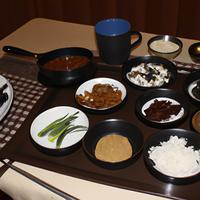
1 serving (500 grams) contains 600 calories, 30.0 grams of protein, 20.0 grams of fat, and 80.0 grams of carbohydrates.

Log this food in SnapCalorie

Nutrition Information
Calories |
283.9 | ||
|---|---|---|---|
% Daily Value* |
|||
| Total Fat | 9.5 g | 12% | |
| Saturated Fat | 2.4 g | 12% | |
| Polyunsaturated Fat | 0 g | ||
| Cholesterol | 23.7 mg | 7% | |
| Sodium | 709.8 mg | 30% | |
| Total Carbohydrates | 37.9 g | 13% | |
| Dietary Fiber | 3.8 g | 13% | |
| Sugars | 4.7 g | ||
| protein | 14.2 g | 28% | |
| Vitamin D | 0 mcg | 0% | |
| Calcium | 47.3 mg | 3% | |
| Iron | 1.4 mg | 7% | |
| Potassium | 236.6 mg | 5% | |
* Percent Daily Values are based on a 2,000 calorie diet. Your daily values may be higher or lower depending on your calorie needs.
Food Attributes
Source of Calories
About Korean dinner
Korean dinner is a vibrant and balanced meal rooted in traditional Korean cuisine, known for its bold flavors and nutritious components. Typically, it features steamed rice paired with a variety of side dishes called "banchan," including fermented kimchi, stir-fried vegetables, marinated protein like bulgogi or grilled fish, and hearty soups such as kimchi jjigae or doenjang jjigae. Korean meals emphasize fresh ingredients, minimal use of processed foods, and natural seasonings like garlic, ginger, and sesame oil. The inclusion of fermented foods like kimchi supports gut health, while vegetables and lean proteins provide essential nutrients and energy. However, some dishes can be high in sodium due to soy sauce and fermentation, or rich in fats depending on preparation methods. Korean dinner embodies both balance and flavor, offering a fulfilling dining experience with a mix of health benefits and indulgent richness.



